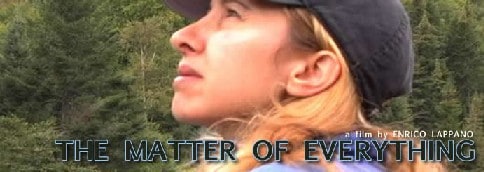
Olga Antzoulatos in The Matter of Everything. Credit: Enrico Lappano
By Margaret Harris
This is the last in our current series of film reviews. Send us more films!
The narrator of The Matter of Everything spends most of the film looking puzzled. After all, it’s a puzzling world out there — full of particles that act like waves, matter turning into energy, and all sorts of strange things. Even empty space, it seems, is a lot more complicated than it looks. Such topics can easily ensnare experts in their conceptual knots, so any amateur willing to tackle them deserves a great deal of credit. Here, the brave newcomer is Olga Antzoulatos, a high school teacher who decides to spend some time interviewing particle physicists about their research. To this end, she travels to Fermilab and Toronto’s York University and starts asking questions.
With such a broad subject, and only 100 minutes of film to play with, it’s inevitable that some answers get short shrift. However, that’s not really the point; both Antzoulatos and filmmaker Enrico Lappano are far more interested in the sense of wonder that arises from contemplating nature on such a deep level. Sometimes their efforts pay off — like when Lappano’s camera seeks out a clutch of bird eggs amid concrete slabs at Fermilab, and one of Antzoulatos’ interviewees likens Ernest Rutherford’s experimental knack to “having a red phone to God”.
Still, there’s something missing from this film, and it isn’t a better description of quarks and gluons — it’s a better sense of why Antzoulatos chose to embark on her quest in the first place. What drew her to introduce students in her “Society: Challenge and Change” class to particle physics? How can we encourage more non-scientists to follow in her footsteps? As its title implies, The Matter of Everything is not short of ambition. It’s just a pity it didn’t ask a few more questions.



